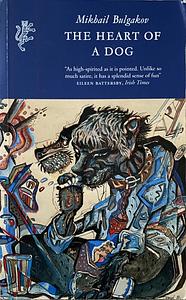You need to sign in or sign up before continuing.
Take a photo of a barcode or cover
dark
funny
tense
fast-paced
Plot or Character Driven:
Character
Strong character development:
Complicated
Loveable characters:
No
Diverse cast of characters:
No
Flaws of characters a main focus:
Yes
I may be too dumb or not Soviet enough to understand the metaphor being made, but it’s still a darkly funny book and a breezy read. An admirable addition to Frankenstein monster genre.
funny
medium-paced
He’s got that dog in him!
Originally written in 1925, Mikhail Bulgakov’s scathingly satirical The Heart of a Dog would not become available to readers until [a:Michael Glenny|73039|Michael Glenny|https://s.gr-assets.com/assets/nophoto/user/u_50x66-632230dc9882b4352d753eedf9396530.png]’s 1968 translation into English as both the book and Bulgakov’s subsequent play adaptation were banned and the manuscripts were confiscated. But, as goes the now famous Bulgakov quote from [b:The Master and Margarita|117833|The Master and Margarita|Mikhail Bulgakov|https://i.gr-assets.com/images/S/compressed.photo.goodreads.com/books/1327867963l/117833._SY75_.jpg|876183], ‘manuscripts don’t burn,’ and, thankfully this book came to light via samizdat—the spreading of censored or illegal documents by handwritten or memorized reproductions passed between reader (it would not appear in the Soviet Union until 1987). Heart of a Dog is a short but snappy satire on the Soviets and rejection of eugenics where a dog is surgically transformed into a man and runs amok as if Bulgakov is harmonizing with [a:Mary Shelley|11139|Mary Wollstonecraft Shelley|https://images.gr-assets.com/authors/1699348762p2/11139.jpg]’s [b:Frankenstein|35031085|Frankenstein The 1818 Text|Mary Wollstonecraft Shelley|https://i.gr-assets.com/images/S/compressed.photo.goodreads.com/books/1631088473l/35031085._SY75_.jpg|4836639] to show that when creating a monster you end up…well creating a monster. And this one toes the party line and wields State authority for the joy of cruelty. A bizarre but boisterous little novella that throws powerful punches, Heart of a Dog in an important but often overlooked satire on the Soviet Union and a frighteningly fun read.
‘Nobody should be whipped. Remember that, once and for all. Neither man nor animal can be influenced by anything but suggestion.’
As I sit here waiting for my train to Oxford to finally get moving again, I thought I’d reflect a bit on this blisteringly sharp and funny little book. It’s a crude comedy and Bulgakov doesn’t pull punches as he takes aim on Bolshevism and the aftermath of the revolution. The story surrounds a stray dog who, upon dying in the streets from scalding water, instead wakes up like that scene in Robocop to discover he has been saved by some ill-fated science experimentation. He becomes Sharik, but when the doctor, never finished with his experimenting, gives him the organs of a now-deceased criminal, Sharik is fully human and ready to rumble. The once gentlemanly dog now rejects manners as ‘bourgeois’ and falls into vice and sexual assault before falling in with the communist party itself. The metaphor is pretty on the nose here for effect, and it is with great delight Bulgakov attacks the State as the basest of human judgement.
‘The whole horror of the situation is that he now has a human heart, not a dog's heart. And about the rottenest heart in all creation!’
We can see the dog as a rather dynamic metaphor of the Russian revolution and a function of the average person, promised the great change of revolution that, once the dust settles, finds them still in poor circumstances and now at the mercy of a cruel and violent State. Bugakov touches upon many of Shelley’s themes in Frankenstein, where the absence of any moral upbringing of the monster is an image of a government itself. Which is handled quite effectively by also being a blunt rejection of eugenics.
As always with Bulgakov, names mean a great deal. The criminal, Chugunkin, is a name meaning “cast iron” in the Russian, which is a play on the name Stalin coming from the word for “steel.” It makes for some pretty direct satire and insults at the leader, who was a fan of Bulgakov’s works. Which is all the more delightful that Bulgakov, knowing this, still mocked him (though faced prison for doing so throughout his career). Bulgakov always has a lot of context with his current times as well, with the doctor being based on Serge Voronoff, a doctor who was implanting monkey testicals into humans in hopes of it being an anti-aging technique. You read that correctly.
Brief, bizarre but brillant, Heart of a Dog is a comedic gem. While nothing can stand as tall as Bulgakov’s [b:The Master and Margarita|117833|The Master and Margarita|Mikhail Bulgakov|https://i.gr-assets.com/images/S/compressed.photo.goodreads.com/books/1327867963l/117833._SY75_.jpg|876183]—it’s a masterpiece—this is still a satisfying read.
4.5/5
Originally written in 1925, Mikhail Bulgakov’s scathingly satirical The Heart of a Dog would not become available to readers until [a:Michael Glenny|73039|Michael Glenny|https://s.gr-assets.com/assets/nophoto/user/u_50x66-632230dc9882b4352d753eedf9396530.png]’s 1968 translation into English as both the book and Bulgakov’s subsequent play adaptation were banned and the manuscripts were confiscated. But, as goes the now famous Bulgakov quote from [b:The Master and Margarita|117833|The Master and Margarita|Mikhail Bulgakov|https://i.gr-assets.com/images/S/compressed.photo.goodreads.com/books/1327867963l/117833._SY75_.jpg|876183], ‘manuscripts don’t burn,’ and, thankfully this book came to light via samizdat—the spreading of censored or illegal documents by handwritten or memorized reproductions passed between reader (it would not appear in the Soviet Union until 1987). Heart of a Dog is a short but snappy satire on the Soviets and rejection of eugenics where a dog is surgically transformed into a man and runs amok as if Bulgakov is harmonizing with [a:Mary Shelley|11139|Mary Wollstonecraft Shelley|https://images.gr-assets.com/authors/1699348762p2/11139.jpg]’s [b:Frankenstein|35031085|Frankenstein The 1818 Text|Mary Wollstonecraft Shelley|https://i.gr-assets.com/images/S/compressed.photo.goodreads.com/books/1631088473l/35031085._SY75_.jpg|4836639] to show that when creating a monster you end up…well creating a monster. And this one toes the party line and wields State authority for the joy of cruelty. A bizarre but boisterous little novella that throws powerful punches, Heart of a Dog in an important but often overlooked satire on the Soviet Union and a frighteningly fun read.
‘Nobody should be whipped. Remember that, once and for all. Neither man nor animal can be influenced by anything but suggestion.’
As I sit here waiting for my train to Oxford to finally get moving again, I thought I’d reflect a bit on this blisteringly sharp and funny little book. It’s a crude comedy and Bulgakov doesn’t pull punches as he takes aim on Bolshevism and the aftermath of the revolution. The story surrounds a stray dog who, upon dying in the streets from scalding water, instead wakes up like that scene in Robocop to discover he has been saved by some ill-fated science experimentation. He becomes Sharik, but when the doctor, never finished with his experimenting, gives him the organs of a now-deceased criminal, Sharik is fully human and ready to rumble. The once gentlemanly dog now rejects manners as ‘bourgeois’ and falls into vice and sexual assault before falling in with the communist party itself. The metaphor is pretty on the nose here for effect, and it is with great delight Bulgakov attacks the State as the basest of human judgement.
‘The whole horror of the situation is that he now has a human heart, not a dog's heart. And about the rottenest heart in all creation!’
We can see the dog as a rather dynamic metaphor of the Russian revolution and a function of the average person, promised the great change of revolution that, once the dust settles, finds them still in poor circumstances and now at the mercy of a cruel and violent State. Bugakov touches upon many of Shelley’s themes in Frankenstein, where the absence of any moral upbringing of the monster is an image of a government itself. Which is handled quite effectively by also being a blunt rejection of eugenics.
As always with Bulgakov, names mean a great deal. The criminal, Chugunkin, is a name meaning “cast iron” in the Russian, which is a play on the name Stalin coming from the word for “steel.” It makes for some pretty direct satire and insults at the leader, who was a fan of Bulgakov’s works. Which is all the more delightful that Bulgakov, knowing this, still mocked him (though faced prison for doing so throughout his career). Bulgakov always has a lot of context with his current times as well, with the doctor being based on Serge Voronoff, a doctor who was implanting monkey testicals into humans in hopes of it being an anti-aging technique. You read that correctly.
Brief, bizarre but brillant, Heart of a Dog is a comedic gem. While nothing can stand as tall as Bulgakov’s [b:The Master and Margarita|117833|The Master and Margarita|Mikhail Bulgakov|https://i.gr-assets.com/images/S/compressed.photo.goodreads.com/books/1327867963l/117833._SY75_.jpg|876183]—it’s a masterpiece—this is still a satisfying read.
4.5/5
dark
funny
mysterious
medium-paced
Plot or Character Driven:
A mix
Strong character development:
Complicated
Loveable characters:
Complicated
Diverse cast of characters:
Complicated
Flaws of characters a main focus:
Yes
adventurous
funny
mysterious
reflective
medium-paced
dark
funny
reflective
tense
fast-paced
Plot or Character Driven:
Plot
Strong character development:
Yes
Loveable characters:
No
Diverse cast of characters:
No
Flaws of characters a main focus:
Yes
dark
funny
reflective
fast-paced
funny
reflective
medium-paced
Plot or Character Driven:
A mix
Strong character development:
Complicated
Loveable characters:
Complicated
Diverse cast of characters:
Complicated
Flaws of characters a main focus:
N/A
adventurous
funny
reflective
sad
medium-paced




